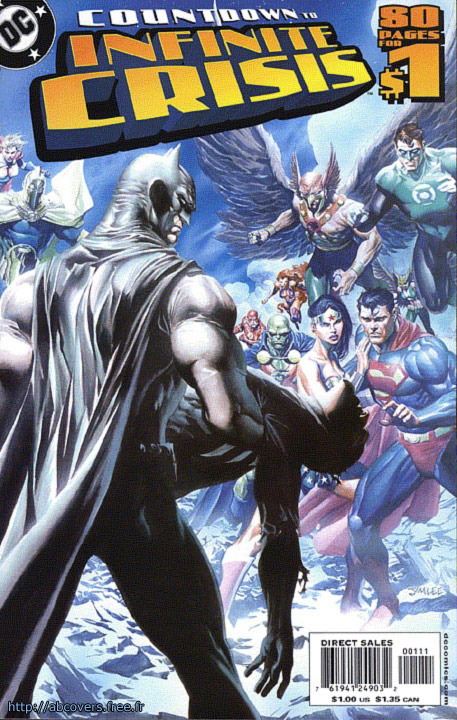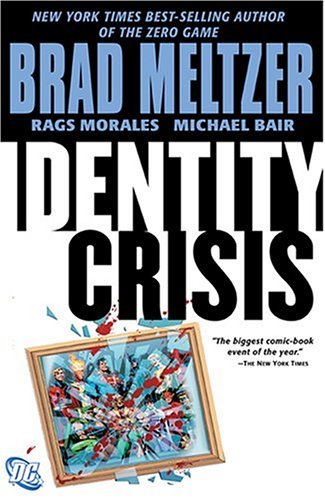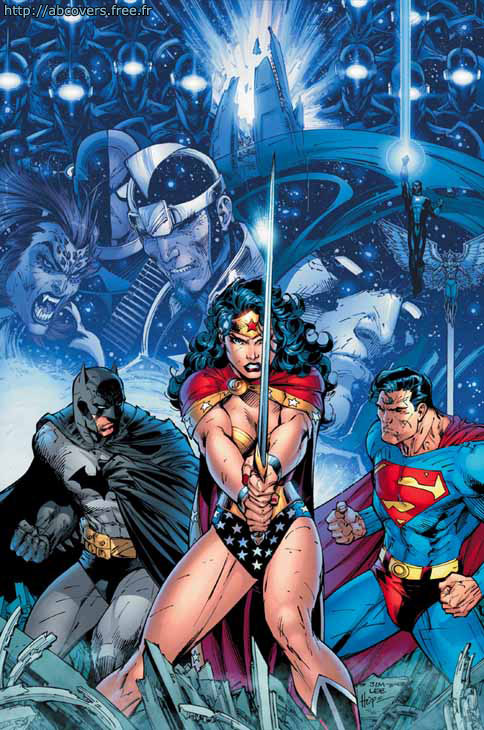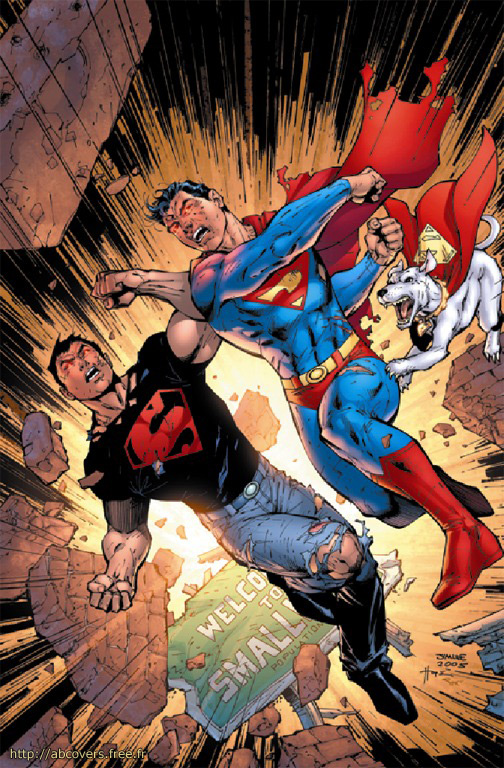The Long Awaited Infinite Crisis Review
 Apparently, it is believed that every few years we need to reset comic book continuity. I don’t agree with this theory, but I suppose it’s inevitable.
Apparently, it is believed that every few years we need to reset comic book continuity. I don’t agree with this theory, but I suppose it’s inevitable.After all, continuity can be hard enough to keep track of when you have a single author working with the characters.
That’s not what DC is dealing with.
 They’re working with a comic book universe, and not just any comic book universe, but one where you are dealing with the icons of superhero-hood (and while I may prefer many of the Marvel heroes they just don’t get any bigger or more recognizable than DC’s Big Three).
They’re working with a comic book universe, and not just any comic book universe, but one where you are dealing with the icons of superhero-hood (and while I may prefer many of the Marvel heroes they just don’t get any bigger or more recognizable than DC’s Big Three).In this environment you have dozens of authors currently working with the characters, and hundreds who have come before you, editors and executives, all of whom are pulling the characters in a dozen different directions.
So, as much as I despair over it, it’s only natural that there are going to be gaffes in continuity. Hence, we get Crisis on Infinite Earths and Zero Hour and now, Infinite Crisis.
This wasn’t all bad. It really wasn’t. There were bad parts, to be sure, but there was some enjoyable moments throughout the series as well.
 We began with Identity Crisis, and the murder of Sue Dibny, the brain-wiping of supervillains, and the revelation of Dr. Light as a rapist. A good friend of mine explained why he hated this. It exemplified the “maturity” of comic books in recent years.
We began with Identity Crisis, and the murder of Sue Dibny, the brain-wiping of supervillains, and the revelation of Dr. Light as a rapist. A good friend of mine explained why he hated this. It exemplified the “maturity” of comic books in recent years.By maturity, he didn’t mean complex stories that reveal the nature of the characters. He meant “mature themes”, like sex and gritty violence. These aren’t comics he would feel comfortable sharing with his son. And I get that. I read these issues, and I love them, but there is a real loss of innocence with these stories.
And the DC icons have often struggled with that issue, as shown in the fabulous What's So Funny 'Bout Truth and Justice? from Action Comics #775.
Reading Countdown, we see the world turn even darker. Maxwell Lord’s plot pervaded the entire DCU, and the death of Ted Kord was absolutely shocking. The other lead-ins continue this trend.
 Villains United has the Secret Society of Supervillains and the Secret Six show a terrifying unity of purpose with supervillains, villains determined to get revenge on the Justice League.
Villains United has the Secret Society of Supervillains and the Secret Six show a terrifying unity of purpose with supervillains, villains determined to get revenge on the Justice League.Day of Vengeance has the Spectre destroy all magic.
The OMAC Project continues Max Lord’s villainy.
And The Rann-Thanagar War sets an intergalactic war the likes of which the DCU has never seen, ranking right up there with the Kree-Skrull War from Marvel, which redefined the Avengers, the Fantastic Four, and established that humanity has an incredible potential in the universe.
The DCU has become a scary, scary place. The Justice League has broken apart at the seams, Superman, Batman and Wonder Woman no longer trust one another, and we are so far removed from the sense of joy that comics contained when I was a kid.
 So it made perfect sense for Kal-L, the Superman of Earth-2 to want to bring his universe back.
So it made perfect sense for Kal-L, the Superman of Earth-2 to want to bring his universe back.Now, there were problems with Infinite Crisis, don’t get me wrong. First, Alexander Luthor and Superboy Prime’s plan to rebirth the universe involves them violating everything that ever made them heroes.
And the argument that this universe is going away, so anything they do to achieve their goal is worthwhile doesn’t hold up. "It was for the greater good" is the last argument of the failed hero, in my book.
But generally, I liked Infinite Crisis. I’m looking forward to reading 52, and what I’ve seen from the One Year Later continuity has me hopeful. Sure, there are some dark, dark moments in their history, but there is a renewed sense of hope in the One Year Later books.
 Did we need the deaths and other changes to characters that Infinite Crisis is responsible for? I’m not sure, but they will make for some good stories, I believe. And they illustrated how far Luthor and Superboy Prime had fallen. I look forward to seeing a resolution to the death of Conner Kent. I want to know more about the future of the Marvels. I thrill at the idea of seeing Kyle Rayner become something more than “the fill-in Green Lantern.”
Did we need the deaths and other changes to characters that Infinite Crisis is responsible for? I’m not sure, but they will make for some good stories, I believe. And they illustrated how far Luthor and Superboy Prime had fallen. I look forward to seeing a resolution to the death of Conner Kent. I want to know more about the future of the Marvels. I thrill at the idea of seeing Kyle Rayner become something more than “the fill-in Green Lantern.”Did we need all of the changes to continuity? Again, probably not. I dream of a comic universe where the characters age and grow as time passes, and that the Cosmic Reset button need never be pushed. But that way lies madness, and a lack of marketing potential. And none of these changes are going to drive me insane, so I’ll manage.
So, while I wish it hadn’t been needed, Infinite Crisis manages to get a passing grade in my book. Sadly, it’s still going to fit in the category of “homework”, something that you need to read to understand the new DCU. It’s not the best story ever, but I think it will be more enjoyable, and less of a chore to read than Crisis on Infinite Earths.
Sorry this took so long to get up. I blame the theatre. Civil War is coming soon.


7 Comments:
you didn't mention anything to do with your show...how is it going? are you having a great time..i hope it's a great success...
I agree. As soon as Crisis on Infinite Earths came along, people started incorporating pre-Crisis touches into their stories. Then Zero Hour came along to clean up that mess. Infinite Crisis was good, but hardly necessary.
"'It was for the greater good' is the last argument of a failed hero."
How do you feel about the ending of Watchmen? Is anyone in that scenario acting admirably? Is acting admirably even possible in the face of something like that? I wonder if there is a point at which satisfying personal honor becomes itself unheroic. Or at which heroism stops being an option, and there are only evils to choose from.
I think people in positions of power must often struggle with the tension between being a hero and compromising personal integrity to work for the good of others.
Part of the thing about Watchmen was that despite being costumed "heroes", they were mostly all rather average people under the masks.
If anyone was acting traditionally heroic at the end it was Rorschach. Ozymandias gave up his heroism even though he had every reason to believe that the world was heading unswervingly towards nuclear annihilation. Nite-Owl and Silk Spectre didn't act heroically at the end, they acted like normal, realistic people. Dr. Manhattan's killing of Rorschach pretty much sealed the fact that he'd ascended beyond caring about people as individuals. Dr. Manhattan becomes exactly what Superman has spent so much effort to avoid becoming, a being removed from humanity, who cares only for the big picture of the species and very little about the individual components.
One has to wonder if Manhattan would eventually stop caring about humanity as well as he continues to widen his universal view.
So I'd say in the end Rorschach is the most heroic one. He's willing to take the hard path to reveal the truth and try to find justice for the thousands killed by Ozymandias. He won't compromise his belief that those people deserve their justice even if it puts the world back at risk of nuclear destruction. To him the individuals still mean as much as the entire populace.
Sorry for hijacking the discussion to Watchmen, but I think it really is a good tool for talking about these kinds of issues.
I agree, Rorschach is being the most traditionally heroic. I guess my question is, what is Moore saying about that?
Manhattan's drifting away to care about things that aren't humanity, but might that not be the proper role for something like what he's becoming? Would it be *better* for him, as his powers grow beyond any limits, to wave his hand and make things different, to try to solve humanity's problems for it -- and would that not become his responsibility if it fell within his power? He's no longer an inspiration at that point; he's a god. He's the super-powered hero taken to its final extreme, and would be forced to make the decision to leave humanity to earn its own way or become totally dependent on him. He *does* stop caring about people as individuals -- but he still cares about the *idea* of people, even the idea of individual people. I wonder if Moore isn't saying that this might not be how a god would have to work. Heroism isn't an option for him any more because his actions aren't an example or inspiration or based on principle; whatever he does really does affect all of humanity, and if he worked for its benefit it would become *his* humanity, his pets. And he isn't interested in having that responsbility. Killing Rorschach is probably the last actual human action he ever takes.
As for Ozymandias: I don't think he gave up his heroism, his personal principles, *despite* the fact that he knew the world was headed toward nuclear destruction; I think he gave it up *because* he knew that, and believed his personal honor was a necessary (and in a twisted way, equally heroic) sacrifice.
I guess how I see his situation is as follows: he should have been smart enough to figure out a way to stop nuclear war without killing people -- and if he couldn't figure that out, he should have had the humility to realize that, smart as he was, he wasn't the man for the job. His answer to that would be "If I don't do it, no one will" -- which leads to the bitter response, "If you need to make that kind of compromise to save humanity, maybe humanity needs to die." And how heroic is that?
Rorschach won't compromise. But is he *right* to want to reveal the truth, whatever damage it might do? He may be honorable -- but is he right? When is personal integrity no longer worth the cost? Is there such a point? And are his motives noble? Believing that dead people deserve justice (whatever that is) is one thing; having faith that humanity, knowing the truth, will give itself a better fate than this one is something else. Rorschach, though, doesn't care about the consequences, whether or not things will turn out all right. Just the principle. And he does it because he wants to be morally right, or for the world to be morally right, the way he thinks it should be, even if it isn't actually that way.
I guess what I'm looking for is: whose position seems the most defensible? Whose is least repulsive? Manhattan's abdication of responsibility in the face of his own power? Veidt's willingness to sacrifice his own principles and millions of lives for what he hopes he's smart enough to know is the "greater good"? Or Rorschach's willingness to take responsbility for the possible destruction of all humanity just to preserve his own vision of the way things ought to be?
I guess what it comes down to for me is, what's most important? Saving the largest number of lives? Preserving other people's right to determine their own fates? Or to be able to say that you yourself haven't broken your own rules? Or is there some other overarching value that heroes need or perceive that I'm missing?
I think this is exactly the kind of debate Moore wants from his writings. Moore rarely gives us conclusions to the moral issues he brings up, he gives us conclusions to his stories and the rest is up to us.
Yeah, identifying the questions is an end in itself. I do find value in continuing to ask them, but each of us has to find the answers in his or her own way, I guess.
Post a Comment
<< Home